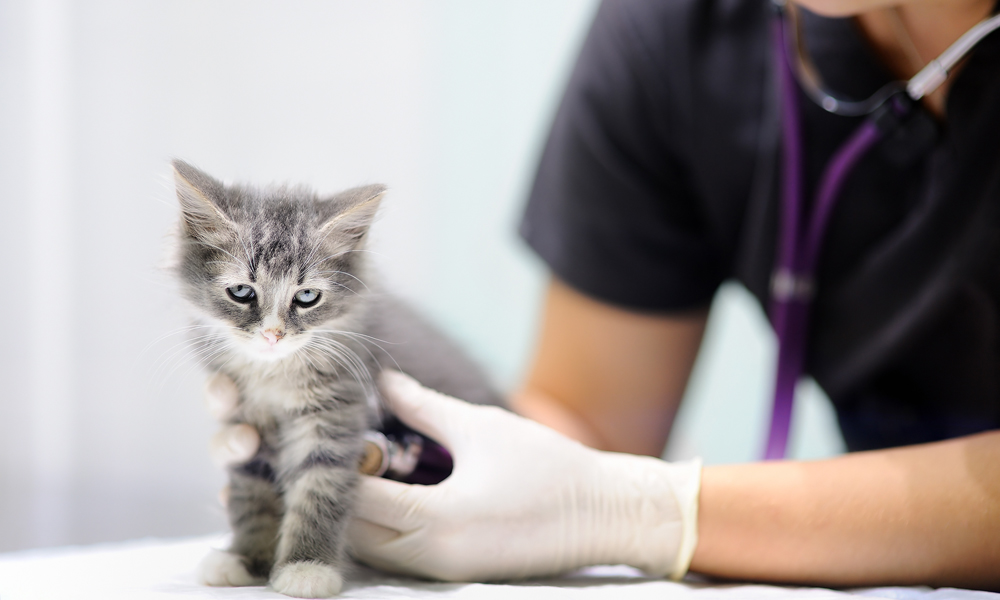When cats show signs of a sensitive stomach, pet parents can pretty easily become complacent. Perhaps we get used to seeing them cough up hairballs every couple weeks, leading us to believe stomach irritation is just part of being a cat. But cat puke, when it doesn’t have any signs of hairball, can be a symptom of something more serious.
When a cat has an upset stomach, it comes with four tell-tale signs.
- Vomiting
- Diarrhea
- Licking lips (which often accompanies nausea)
- Refusing food
Let’s take a look at the common causes of stomach upset in cats, when to know if your cat’s stomach issues are serious, and what you can do to soothe your cat’s stomach.
What causes stomach upset in cats?
Most cats get a tummy ache from time to time, and these are the most common causes of stomach sensitivity.
Diet and diet changes
If your cat has an allergy or sensitivity to an ingredient — corn, soy and other filler ingredients in bargain brands are common — that can lead to stomach upset.
Stress
If your car suffers from separation anxiety, or if you recently moved or added a family member to your home (human or animal), that stress could be the source of your cat’s stomach issues. If your cat is up to it, carve out some extra one-on-one time to alleviate their emotional distress.
Medication
Is your cat being treated for fleas or some other medical issue? Check the dosage and application. When cats ingest too much topical medications through grooming, it can irritate the stomach.
Eating something toxic (like the leaf of a plant, an insect or something that kitty wanted to paw at and bite) can also cause issues. Beware: Some plants can be fatal, so make sure you rid your house and garden of poisonous plants.
[Read more about keeping cat-friendly houseplants in your home.]
When is a cat’s sensitive stomach serious?
A cat with a sensitive stomach can indicate underlying medical issues. For that reason, make sure your cat is getting their annual checkups — twice a year for kittens and senior cats. As we discussed in an earlier blog, there’s a high percentage of pet parents that skip their cat’s wellness visits, indoor kitties especially. A thorough examination complete with bloodwork can rule out a serious health problem and give you peace of mind that you’re doing the right thing for your cat.
Vomiting can be a symptom of many medical issues in felines. Here’s a partial list:
- Intestinal parasites
- Pancreatitis
- Virus bacteria
- Cancer
- Abdominal obstruction (blockage produced by a large hairball or ingested string)
- Hyperthyroidism
- Kidney failure
- Liver failure
If your feline friend is vomiting several times a day, and has refused food for 48 hours, your cat should be seen immediately by a professional. Other signs that something is seriously wrong include lethargy, weight loss and sudden changes in behavior, like hiding.
If your cat is regularly producing non-watery vomit that’s free of grass and hairballs, even if it’s only monthly, make that vet appointment so kitty can start getting treatments and relief.
One of the first things your vet may want to rule out is intestinal worms, which are pretty common in cats that spend time outdoors. The culprit could be roundworms or hookworms, but tapeworms are most common.
Tapeworms occur when a flea larvae eats the eggs of a tapeworm. When kitty accidentally ingests the larvae through grooming, or biting at an itchy flea bite, the tapeworm eggs get released during the digestive process. From there the eggs hatch and the tapeworms attach to your cat’s intestinal lining. Indoor cats are less likely to suffer tapeworms, but it happens, as fleas can find their way into the home. If your vet finds evidence of tapeworms, or other parasitic problems, they’ll recommend a dewormer for cats, followed by regular prevention treatments.
Keeping kitty’s tummy worry free
Once you and the vet rule out serious issues, stay focused on promoting good digestive health in cats.
Regular deworming treatments
Depending on your cat and their outdoor habits, many animal health care professionals recommend preventive treatments every one to three months. You can also check your local independent bricks-and-mortar pet store for over-the-counter treatments. Some pet parents swear by naturopathic options.
Regular wellness visits
An annual examination for your cat establishes a baseline for their health, and regular bloodwork can help kitty’s health professional identify problems early before they cascade into something more serious.
Groom your cat regularly
Daily brushings can minimize the volume of hair that ends up in your cat’s stomach. In addition, paying close attention to your cat each day will make it easier for you to notice changes that could be early signs for medical attention.
Feed your cat a high-quality diet
To soothe kitty’s sensitive tummy, look for diets that are made from high-quality ingredients with meat or meat meal listed first on the ingredients. Cheap fillers like corn should be avoided, as these can be the irritating root cause of your cat’s stomach issues. Try a wet food that is the same protein as the dry kibble. The moist content of wet food is a great addition to your cat’s diet because it’s hydrating and helps them absorb more nutrients.
Trying a grain-free single-protein diet can give your cat’s tummy a break. Pure Vita Limited Ingredient Grain Free Dry is the perfect single-protein solution for cats. Available in delicious chicken, duck or salmon, Pure Vita is fortified with NutriSource’s innovative Good 4 Life® supplement system. Good 4 Life is packed with probiotics and prebiotics to build good gut health, which aids in better digestion, better absorption of nutrients, and enhances your cat’s ability to fight off infection. If you want to see less vomiting, fewer hairballs and fewer messes in the litterbox, you’ll want to pick up a bag today. Shop local and find Pure Vita at your independent pet retailer.


